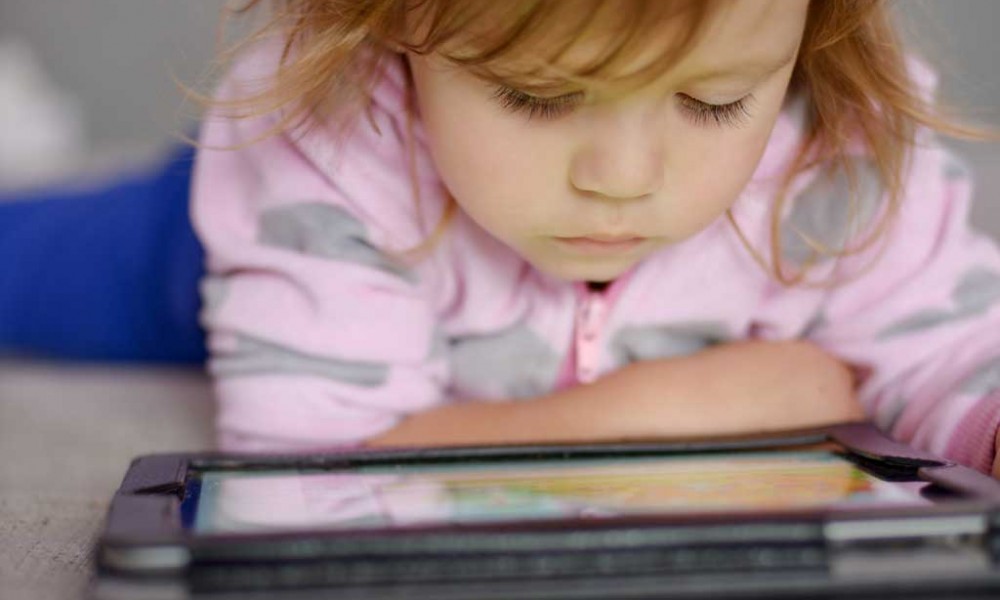Usage Is Occurring When Human Interaction Is Key To Developing Strong Communication Skills
A new survey of U.S. parents commissioned by the American Speech-Language-Hearing Association (ASHA) finds significant percentages reporting technology use by very young children and more than half of the parents surveyed have concerns about the potential negative impact of technology use on the ability of the young to communicate.
Conducted this past March, the survey polled 1,000 parents of children ages 0–8. Its release of the results occur during Better Hearing & Speech Month, a national observance that raises awareness of speech, language, and hearing disorders—and spotlights the importance of communication health.
Sixty-eight percent of surveyed parents’ 2-year-olds use tablets. Meanwhile, 59% use smartphones, and 44% use video game consoles.
The most rapid period of brain development takes place before age 3. The primary way young children learn is through verbal communication that technology simply cannot duplicate.
Such results raise questions about the course of the development of the very young’s capacities to communicate, according to Judith L. Page, PhD, CCC-SLP, 2015 ASHA president.
“The most rapid period of brain development takes place before age 3,” Dr. Page notes. “The primary way young children learn is through verbal communication that technology simply cannot duplicate.”
She adds: “Indeed, despite advances in technology, it remains critical that children have sufficient opportunities to develop their vocabulary and communication skills by listening, talking, reading, and interacting with their parents and others, for which there is no substitute.”
Survey respondents say technology holds positive promise. However, majorities express concern about how its misuse can harm communication health.
- 55% have some degree of concern that misuse of technology may be harming their children’s hearing; with respect to speech and language skills, the figure is 52%.
- 52% say they are concerned that technology negatively impacts the quality of their conversations with their children; 54% say they are concerned that they have fewer conversations with their children than they would like because of technology.
- Parents recognize the potential hazard of personal audio devices to their children’s hearing; 72% agree that loud noise from technology may lead to hearing loss in their children.
Although it is encouraging that a vast majority of surveyed parents report putting limits on their children’s technology use, the efficacy of those steps is questionable given other survey results.
For example, 24% of 2-year olds use technology at the dinner table—a prime time for the kind of interaction that fosters strong communication development. By age 8, that percentage nearly doubles (45%).
Also, by age 6, 44% of kids would rather play a game on a technology device than read a book or be read to. By age 8, a majority would prefer that technology is present when spending time with a family member or friend.
In addition, more than half of parents surveyed say they use technology to keep kids ages 0–3 entertained; nearly 50% of parents of children age 8 report they often rely on technology to prevent behavior problems and tantrums.
24% of 2-year olds use technology at the dinner table—a prime time for the kind of interaction that fosters strong communication development. By age 8, that percentage nearly doubles (45%). By age 6, 44% of kids would rather play a game on a technology device than read a book or be read to. By age 8, a majority would prefer that technology is present when spending time with a family member or friend.
ASHA President Page encourages parents to set and enforce meaningful and healthy limits early and understand that usage rules need to be adapted as children get older and acquire new interests in technology.
Noting that the majority of polled parents report that their kids use technology devices on car trips, Page says the coming summer season presents unique opportunities to engage kids.
“If a long vacation drive is in store, parents may want to use the time to converse with their children. Such opportunities seem to be getting harder to come by in this busy world. It is important to take advantage of every chance to build strong communication skills.”
Parents can learn more at IdentifytheSigns.org.
About the American Speech-Language-Hearing Association
ASHA is the national professional, scientific, and credentialing association for 182,000 audiologists; speech-language pathologists; speech, language, and hearing scientists; audiology and speech-language pathology support personnel; and students. Audiologists specialize in preventing and assessing hearing and balance disorders as well as providing audiologic treatment, including hearing aids. Speech-language pathologists identify, assess, and treat speech and language problems, including swallowing disorders.





No comments